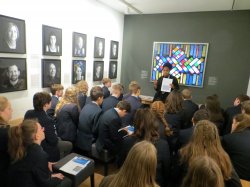Philosophy, Ethics & Religion
Welcome
How should society deal with criminality? Is there life after death? How do religious people respond to humanitarian crises? Are religious teachings still relevant in the 21st Century? How should humans treat each other?
These, along with questions surrounding how to live a Christian and Islamic life in modern Britain make Philosophy, Ethics & Religion (PER) a fascinating subject, which helps students to understand and reflect on different worldviews, including their own. The course is designed to allow students to explore life's big questions in a creative, interesting and academically rigorous way. The department encourages students to use a variety of approaches, including discussion, debate, presentations, creative projects, art, drama, speaking, listening and writing skills, along with the whole school focus on the Edgbarrow8. Through the study of religious and non-religious worldviews, students develop an understanding of life in the 21st Century Britain. Thanks to our exploration of fascinating questions and concepts, Philosophy, Ethics and Religion is a popular options subject at GCSE and A-Level at Edgbarrow School.
Key Staff
Mr Hinz - Head of Department
Mrs Anigbo
Mrs Thurgood
Curriculum Intent
In Philosophy, Ethics and Religion, we aim to inspire students to become independent critical thinkers who can communicate effectively with others. We examine a diverse range of spiritual, moral, philosophical and cultural beliefs and practices, which help our students to develop their own views and teaches them to respect the views of others.
Key Stage 3
Year 7 & 8
In Year 7, students study an extended theme on ‘Founders of Faith’ which allows them to explore religious beliefs and practices as well as investigate the main philosophies of living a good life according to some of the major world faiths. This includes reference to holy scripture, in particular, students will be studying extracts from the Bhagavad Gita, a core holy text for Hindus. Students also explore the teachings of the Buddha, in particular his teachings about non-violence and how these are applied by Buddhists today. In the final term, students learn about the life and teachings of Jesus Christ.
In Year 8, students move on to studying what it means to ‘live a moral life’. This will include a study of the life of Prophet Muhammad and how following the 5 pillars of Islam affects the lives of Muslims living in Britain today. Students also learn about non-religious perspectives on morality and ethics through studying Humanist beliefs, including an exploration of the value Humanists place on science over religion and the moral compass used by Humanists. In the final term, students study a topic on moral issues. Within these topics, students are encouraged to explore the ultimate and moral questions relating to euthanasia, abortion, and capital punishment, as well as reflect on their own beliefs and values.
Study throughout Key Stage 3 equips students with the essential skills necessary to continue with Philosophy, Ethics and Religion at GCSE.
Assessment Bands
Students will follow national guidelines throughout Key Stage 3 to support and prepare them for their Key Stage 4 courses. The school operates a banding system of 1-9 (9 being the highest band). Students will be given a target based on their Key Stage 2 scores and baseline assessments on arrival at Edgbarrow. The band they are awarded at the end of the Key Stage is intended to be indicative of the grade they may achieve at GCSE.
FOR YEAR 7 & 8 ONLY: We have recently changed how we track progress in Key Stage 3. The new format is currently in operation with Years 7 and 8 only. In each subject, students are given one of three progress bands: foundation, intermediate and higher. These bands are based on Key Stage 2 scores, as well as evidence gathered by class teachers. Throughout Key Stage 3, students will be judged to be meeting, exceeding or below expectations for their given band. The headline criteria for each of these bands can be found below, as well as a short presentation explaining the new assessment and reporting format. Key Stage 3 Assessment Video
Summary Curriculum Plans
-
Philosophy Ethics Religion 2024-25 Year 7
download_for_offline
download_for_offlinePhilosophy Ethics Religion 2024-25 Year 7
- Philosophy Ethics Religion 2024-25 Year 8 download_for_offline
download_for_offlinePhilosophy Ethics Religion 2024-25 Year 8
- Philosophy Ethics Religion 2024-25 Year 9 download_for_offline
download_for_offlinePhilosophy Ethics Religion 2024-25 Year 9
Key Stage 4
GCSE
At GCSE Philosophy Ethics and Religion follows the WJEC/Eduqas course in Religious Studies. The course offers an in-depth study into the moral and ethical implications of modern-day sexual relationships, the changing landscape of gender equality, the promotion of and challenges to Human Rights, the causes of criminality and how society should deal with those who commit crimes, as well as issues surrounding life and death, such as abortion and euthanasia. More than just learning about different cultures, beliefs and faiths, the WJEC/Eduqas Religious Studies course allows pupils to critically examine, analyse and evaluate the social values we hold as a society today. These discussions are also framed by and reflected on through a religious perspective, as students also study key Christian and Muslim beliefs, practices and attitudes to moral and social living in today’s world. Investigating these issues in an academically rigorous context allows students to understand more fully the world they live in and develop the ability to develop their own beliefs and values, based on facts and informed discussion.
Course Content and Assessment
The WJEC/Eduqas Religious Studies course is divided into 3 different modules. There is no coursework module, which allows students to fully explore the course without the extra pressure of completing coursework. Therefore, as shown below, students will be fully assessed by 3 written examinations at the end of Year 11.
- Component 1 - Study of philosophical & ethical issues in the modern world. A philosophical and ethical investigation of issues concerning relationships, life after death, good and evil, and human rights. 2-hour written exam (50% of final grade).
- Component 2 - Study of Christianity. An in-depth study of the beliefs, teachings and practices of Christianity. 1-hour written exam (25% of final grade).
- Component 3 - Study of Islam. An in-depth study of the beliefs, teachings and practices of Islam. 1-hour written exam (25% of final grade).
Philosophy, Ethics and Religion are beneficial to students who wish to have a firm humanities base to their qualifications, a wider understanding of what issues are important to people today and an opportunity to develop their skills of evaluation and analysis, which are of great importance for further education. Philosophy, Ethics and Religion is a popular subject with many employers and is highly recommended for any job which involves working with people; such as journalism, business, tourism, social work, law, teaching, nursing and emergency services.
Summary Curriculum Plans
-
Philosophy Ethics Religion 2024-25 Year 10
download_for_offline
download_for_offlinePhilosophy Ethics Religion 2024-25 Year 10
- Philosophy Ethics Religion 2024-25 Year 11 download_for_offline
download_for_offlinePhilosophy Ethics Religion 2024-25 Year 11
Withdrawal from Religious Education (RE)
Parents have the right to choose whether or not to withdraw their child from RE without influence from the school, although a school should ensure parents or carers are informed of this right and are aware of the educational objectives and content of the RE syllabus. In this way, parents can make an informed decision. Where parents have requested that their child is withdrawn, their rights must be respected, and where RE is integrated into the curriculum, the school will need to discuss the arrangements with the parents or carers to explore how the child’s withdrawal can be best accommodated. If students are withdrawn from RE, schools must supervise them, though not to provide additional teaching or to incur extra costs. Students will usually remain on school premises.
Should you wish to withdraw your son or daughter from RE, please contact the Headteacher in writing. Further guidance can be found here.
Key Stage 5
A-Level
Students study the WJEC/Eduqas course in Religious Studies with a particular focus on Islamic beliefs and practices. This is an academically rigorous course, which supports students in developing their critical thinking skills, especially analysis and evaluation. Students will have the opportunity to examine scholarly arguments for the existence of God, the problem of evil and suffering and challenges to belief in God from Psychology and New Atheism. Furthermore, students will explore a range of ethical theories, including Utilitarianism and Natural Law and apply these to issues such as immigration, sexual relationships and the use of nuclear weapons. The course will also entail a close examination of the practices and beliefs of Islam, with a focus on the role of women within society and the Muslim understanding of Jihad. Throughout the course, students will be encouraged to develop an understanding and appreciation of religious thought and its influence on individuals, communities and societies.
Minimum requirements
This subject is available to all students with or without a Religious Studies qualification at GCSE level. However, all students will be expected to have achieved at least a grade 6 or above in English and any Humanities subject they may have studied.Course details
The WJEC/Eduqas Religious Studies course is a linear A2 course, meaning students will be externally examined at the end of Year 13. There is no coursework module, which allows students to fully explore the course without the extra pressure of completing coursework. Therefore, as shown below, students will be fully assessed by 3 written examinations at the end of Year 13.- Component 1 - A study of Islam. An in-depth examination of Islamic beliefs and practices, including evaluating the relevance and impact of Islamic teachings in the 21st Century. 2 hour written exam (33% of final grade).
- Component 2 - A study of the Philosophy of Religion. An exploration of scholarly and theological arguments for and against the existence of God, including a critical examination of the use and meaning of religious language. 2 hour written exam (33% of final grade).
- Component 3 - A study of morality and ethics. An examination of normative ethical theories applied to modern moral issues, such as nuclear weapons as well as scholarly and theological arguments for and against free will. 2 hour written exam (33% of final grade).
Future opportunities
This qualification is useful for access to a diversity of higher education courses at university and a wide range of careers, which focus on the ability to think clearly and rigorously. This includes those hoping to become business leaders, bankers, lawyers, civil servants or any career associated with dealing with people, such in the emergency services, teaching and the armed forces. The skills developed in this course are generally regarded to be ‘softer’ skills, which are highly favoured by today’s employment market.Summary Curriculum Plans
-
Philosophy Ethics Religion 2024-25 Year 12
download_for_offline
download_for_offlinePhilosophy Ethics Religion 2024-25 Year 12
- Philosophy Ethics Religion 2024-25 Year 13 download_for_offline
download_for_offlinePhilosophy Ethics Religion 2024-25 Year 13
Homework Intent
Homework in Religious Studies is set to consolidate subject knowledge and skills. There is a particular emphasis on subject-specific literacy and the development of extended writing skills. At KS3, the principal aim of homework is to support student retention of core content and concepts, whereas, at KS4 and KS4, there is a greater focus on the application of content and concepts through regular exam practice.
Inclusion
It is our intent that pupils with special educational needs/disabilities (SEND) follow the same curriculum, learn alongside their peers and achieve similar outcomes. In addition, they may benefit from additional opportunities in the lessons and in the co-curricular activities that are arranged especially for them.
SEND Implementation and Impact
Literacy
Reading Aims:
- To ensure students are equipped to understand command words in questions.
- To ensure students are equipped with a range of independent reading strategies to aid comprehension when reading and answering exam questions.
- To support students in understanding new or complex vocabulary that they encounter in their reading.
- To support students with reading out loud and therefore pronunciation.
- To encourage students to read for pleasure outside of the lessons.
Writing aims:
- To ensure students are equipped with strategies to construct their answers.
- To ensure students are equipped with a range of independent strategies to enable them to plan their answers carefully.
- To equip students with strategies to reflect on and redraft their writing.
- To explicitly teach spelling, punctuation and grammar to enable students to write fluently.
- To support students in writing extended answers, through teaching them to use tier 3 vocabulary.
- To support students in writing extended answers, through teaching them how to respond effectively to command words.
Spoken Language Aims:
- To ensure students are equipped to use a range of vocabulary as well as subject-specific vocabulary in their spoken language.
- To ensure students are equipped with the skills to participate in formal discussion and debate.
- To support students in using spoken Standard English.
- To teach students how to listen and respond formally.
- To provide students with opportunities for structured talk.
Co-Curricular
Visits to places of worship in the locality, as well as speakers being invited to lessons, will be offered for some topics e.g. prison chaplains, amnesty international, and religious leaders within Christianity and Islam.
At Key Stage 3, the department offers students the opportunity to participate in a trip in Year 7, Year 8 and Year 9, for example to a Hindu temple and a mosque. During Key Stage 4, a trip to Walsingham shrine in Norfolk is offered. This is one of the Christian sites of pilgrimage in the UK, which is on the exam specification and allows students to experience modern Christian life first-hand. At Key Stage 5, students are offered a visit to Regent’s Park mosque in London. Where possible trips abroad are offered; in the past, we have visited Israel, Rome and Morocco, Auschwitz in Poland and Florence.
 Basilica di Santa Croce, Rome
Basilica di Santa Croce, Rome Hassan II Mosque, Morocco
Hassan II Mosque, Morocco  Jewish Museum Visit, London
Jewish Museum Visit, LondonThe department runs a weekly lunchtime enrichment club for students, which is open to all year groups. ‘Philosophy Club’ allows students the opportunity to hone their critical thinking skills by participating in debates and discussions about anything from abstract philosophical concepts such as ‘Is maths real’ and ‘How do we know that we exist’ to moral and ethical questions such as ‘What is the value of a life’ as well as unpacking relevant topics from the news and current affairs, such as the equal gender recognition in religion.
Independent Study
Key Stage 4
View current revision material
Key Stage 5
For further information regarding our Religious Studies Curriculum please contact:
Mr Hinz (Head of Department) - Philosophy Ethics Religion 2024-25 Year 13 download_for_offline
- Philosophy Ethics Religion 2024-25 Year 11 download_for_offline
- Philosophy Ethics Religion 2024-25 Year 8 download_for_offline







